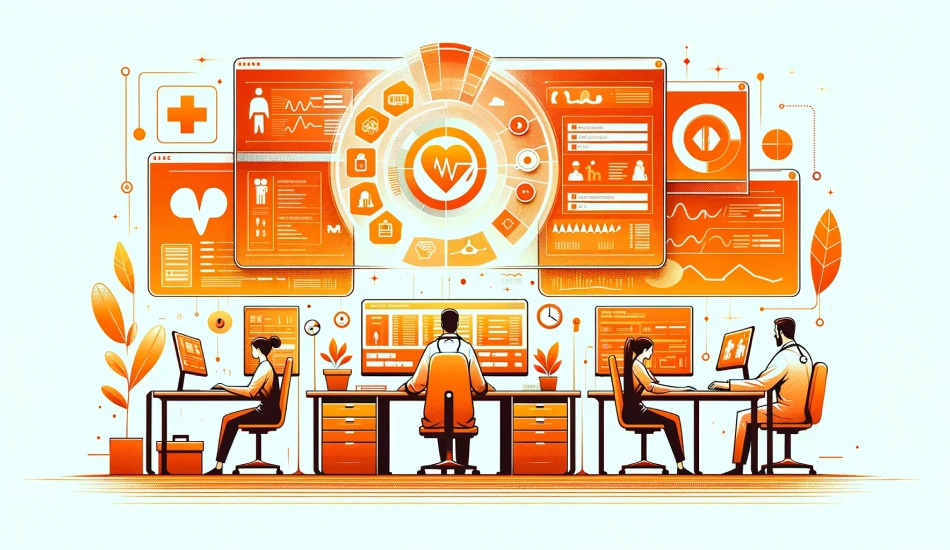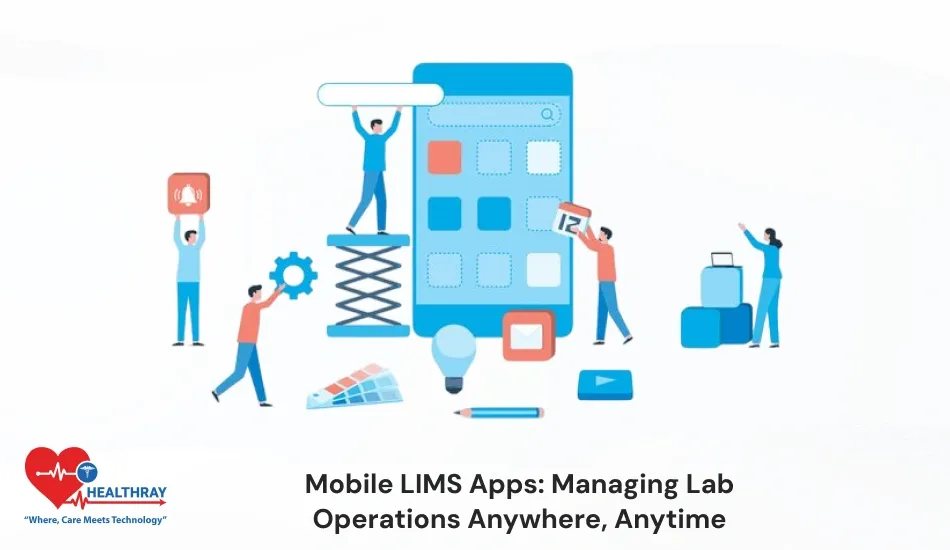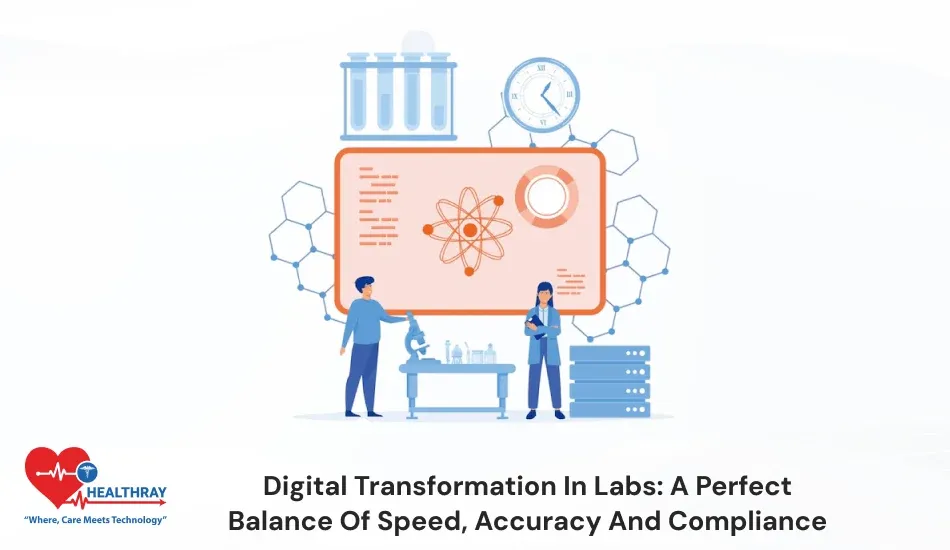Quick Summary: Software for hospital administration is a vital tool for medical institutions. What then are its primary characteristics? staff scheduling, billing and invoicing, appointment scheduling, and patient record management? This isn’t where they finish! It guarantees effective resource allocation, improves patient care, and simplifies operations. It also provides analytics and data security features, which facilitate decision-making. We will go over each of the primary and typical aspects of hospital administration software today. Let’s have a look at top Features of Hospital Management Software!
Introduction
Many sectors, including healthcare, are facing major changes in the rapidly changing world of technology. Particularly in the healthcare industry, collecting enormous volumes of patient data, running hospitals, and keeping track of medical records are difficult tasks. Hospital Management Software (HMS) appears as a crucial answer to these problems. Hospital management software has an amazing and varied range of capabilities. Exploring web based hospital management system development features can help you enhance your practice.
A thorough grasp of the components and functions of a Hospital Management Software is essential for anybody thinking about developing hospital management software. Be at ease! We will dissect every HMS aspect in this blog, offering a thorough explanation of all of its features. Now let’s get started!
What Is Hospital Management Software?
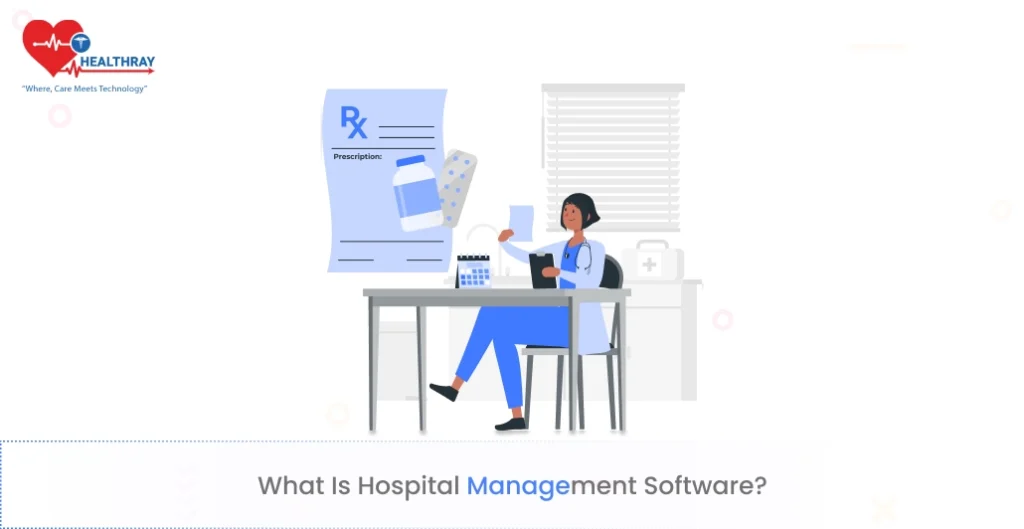
Prior to discussing its operations, it is important to understand the hospital management software (HMS) also known as the hospital information system (HIS). This represents a significant advancement in terms of how hospitals are run. It is not just software made for hospitals; it is a significant step forward in modern healthcare management.
Single software satisfies each and every need of medical stakeholders. Furthermore, it includes a care tool for enhancing patient safety, improving patient outcomes, enhancing patient care, and minimizing patient visits. Additionally, patients receive sufficient time from healthcare providers, physicians have the best opportunity to build a great relationship with other physicians without investing any penny.
This HMS provides an all-in-one answer to reimagining how healthcare facilities function in totality. This will be effective when done through streamlining workflows which makes things like patient registration, appointment scheduling and invoicing easier.
Again, this program promotes more efficient medical staffs’ work and enhances the procedures of governing a hospital. Through HMS, doctors and nurses have access to patients’ data that enables faster and better diagnosis and treatment. Furthermore, smooth integration reduces chances of medication errors thereby resulting in higher satisfaction rates along with improved patient outcomes.
Consequently, HMS helps with medical duties as well as a company’s financial transactions or stocks flow in the healthcare industry. In essence, the Healthcare administration System becomes an operational and strategic powerhouse taking over revolutionizing hospital management.
The numerous advantages it provides highlight how urgent it is to start developing HMS right away.
Some Popular HMS
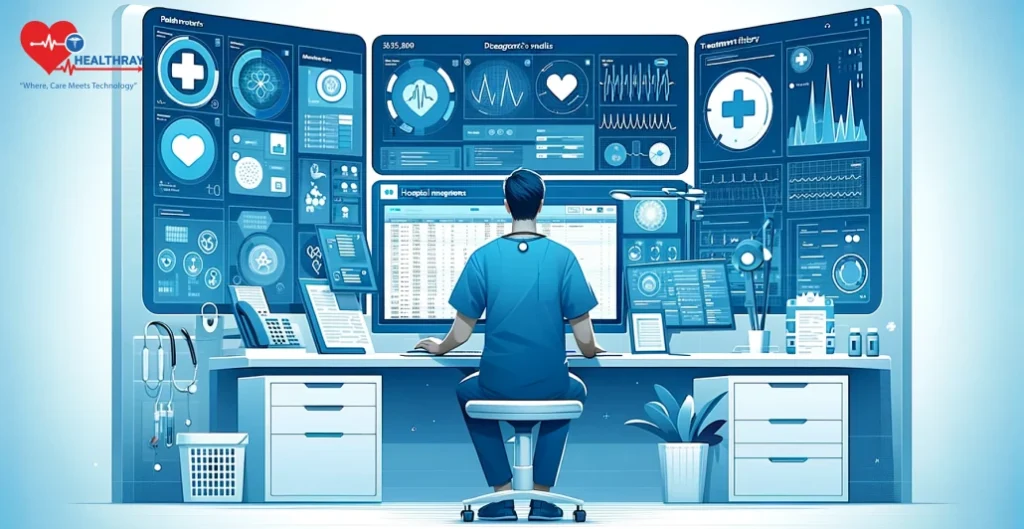
Let’s examine several prominent choices for healthcare management software, each of which has a special function in the delivery of healthcare, including the creation of hospital management systems:
Epic System
- Renowned for being widely used in big healthcare institutions.
- provides a full range of solutions for patient interaction, revenue cycle management, Electronic Medical Record (EMR), and Electronic Health Record (EHR) platforms.
Cerner
- Offers a variety of healthcare management tools as well as EHR solutions.
- Acknowledged for its capacity to manage population health and interoperability.
McKesson
- Specially made for medical facilities and systems.
- Includes components for pharmacy administration, hospital management software, revenue cycle, and electronic health records.
Henahealth
- Focuses on providing medical billing software services and practice management.
- Frequently employed in mid-sized medical offices.
EveryScripts
- Provides healthcare providers with EHR, practice management, revenue cycle management, and patient engagement system.
Healthcare of the Future
- Provides revenue cycle management, practice management, and electronic health records (EHR) to healthcare organizations of all sizes.
Meditech
- Focuses on providing hospitals and healthcare facilities with EHR and healthcare management software solutions.
- Focus on interoperability and usability.
Greenway Medical Centre
- Provides healthcare partners with EHR and revenue cycle management solutions.
- Mostly caters to ambulatory care professionals.
ClinicalWorks
- Offers small to medium-sized medical offices practice management software and electronic health records.
- Incorporates patient involvement tools into outpatient management.
Atria
- A cloud-based electronic health record and practice management system tailored to ophthalmology and dermatological offices.
Features of Hospital Management Software For Hospitals and Doctors
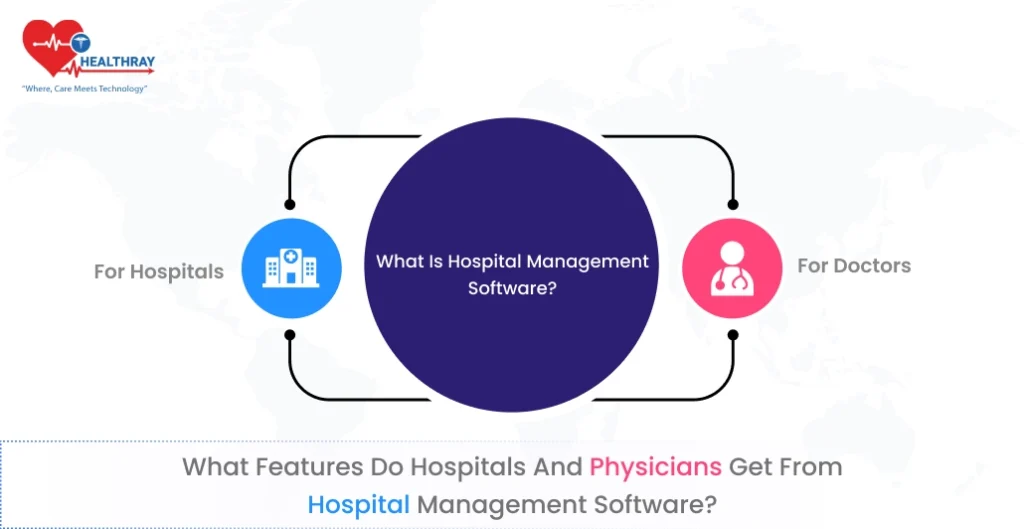
Let’s humanize the idea of hospital management software (HMS) before delving into the functionality. Think of it as a digital ally that works ceaselessly in the background to improve patient care and streamline operations for hospitals.
Swift digitization in the healthcare industry modernizes medical service, minimizes the costs of managing administrative tasks, improves patient outcomes, and improves clinical data. Furthermore, healthcare organizations prepare big medical documentation, create complicated bills, create client reports, administer a number of appointments, and manage patient volume. Therefore, it optimizes operational efficiency, improves healthcare systems, and creates a better healthcare ecosystem.
This digital assistant makes sure everything goes well for patients and healthcare practitioners alike, much like a conductor arranging the symphony of healthcare services.
1. For Hospitals:
Patient Registration
Imagine hospital management system development with a patient registration function like a friendly computer receptionist that welcomes patients, captures their data well and gets rid of paperwork. As such, this ensures accurate and available information about patients’ records and creates a warm organized welcome.
Appointment Scheduling
Just think about using an electronic calendar for booking appointments. This allows staff and physicians to allocate appointments in time, reducing waiting time as well as ensuring efficient use of facilities. It acts like everyone’s personal assistant to make sure they get enough time with the doctor.
Electronic Health Records (EHR)
EHR is a safe digital nurse that documents patients’ medical history electronically. Like an immediate ready memory bank for doctors, it enhances coordination as well as reduces errors associated with traditional paper records keeping.
With the integrated advanced tools, it minimizes medical errors, lowering wastage of medical stock, improving inventory workflow, optimizing resource allocation, improved patient care and reduces stress of medical staff.
Billing and Invoices
Billing and invoices in hospital management software serve as financial geniuses. They ensure the hospital remains financially stable by providing accurate bills outlining medical procedures done. It’s similar to the diligent accountant who deals with money carefully.
Inventory Control
View the inventory control as an inanimate shopkeeper that runs the store. It ensures availability of all healthcare equipment and supplies by monitoring their stock levels. This role minimizes wastage and supports economical health care just like a brilliant arranger who keeps things organized.
Staff Management
With just one look at staff management, it resembles a virtual HR manager for example doctors, nurses and administrative staff. It ensures that everyone is exactly where they should be when they are needed, ensuring smooth running of the hospital.
Laboratory and Radiology Management
The function helps in managing radiology services and laboratory testing. It operates akin to a digital lab assistant. By organizing test results alongside patient samples, it generates an extensive databank of medical information and images.
Prescription Management
Acting as a virtual pharmacist, prescription management simplifies the process involving prescriptions. It also acts like an online drug store which guarantees accuracy during medication to enhance patients’ response to drugs by tracking their previous prescriptions.
Reporting and Analytics
To report and analyze is like being guided by a genius. They will provide extensive reports on operational statistics, financial data and patient data which are the equal of making use of strategic consultants for better medical care.
Security and Access Control
These two measures act as vigilant guardians. They ensure that only those with authorization can access important patient information. That’s akin to having an effective security setup that protects patient privacy.
2. For Doctors:
EHR view
Physicians may safely view and update patient records online using EHR access. It’s similar to having a trustworthy helper arrange patient data so that decisions may be made quickly and precisely.
Appointment Management
Managing and arranging patient appointments is made easier with appointment management. It maximizes the doctor’s time and guarantees that patients receive care on time, much like a personal scheduler.
Prescription Writing
Using prescription writing, physicians may write and deliver digital prescriptions like they would with a digital quill. It ensures precision and readability while prescribing prescriptions, much like a contemporary writing instrument.
Integration of telemedicine
This process links physicians and patients virtually, like to a bridge. As a digital extension of care, it guarantees accessibility even when not in-person.
Communication Tools
These tools serve as electronic messengers. They promote cooperation and patient involvement by enabling safe communication between medical professionals, patients, and coworkers.
Clinical Decision assistance
Offering evidence-based advice and alerts, clinical decision assistance functions similarly to an informed assistant. With the most recent medical knowledge, it helps physicians diagnose and treat patients.
Mobile Accessibility
Task management is made possible for doctors via mobile accessibility. Making sure doctors can easily organize appointments and access information from their mobile devices is like having a pocket-sized assistant.
Billing and Revenue Tracking
These functionalities aid physicians in efficiently handling their finances. It functions similarly to a financial adviser, guaranteeing correct billing and offering financial health transparency for the practice.
What Features Do Patients Get From Hospital Management Software?
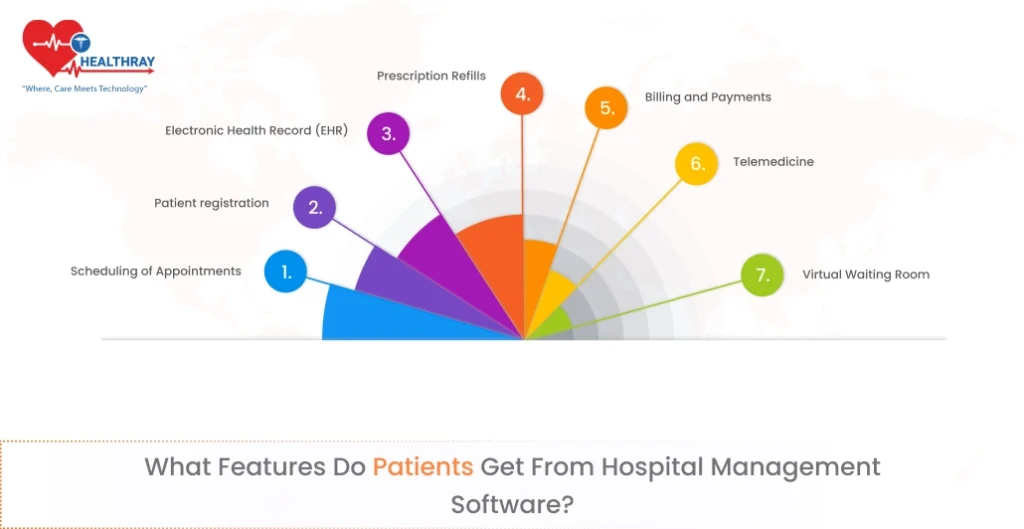
Here are some features of Hospital Management Software for patients. Check them out:
Scheduling of Appointments
Hospital Management Software (HMS) recognises the value of a seamless patient experience. Patients may easily plan their appointments for medical care with an interface that is easy to use. Long wait times are over since patients may select a time and date that works for them thanks to real-time availability. Patients are guaranteed to never miss an appointment by receiving timely reminders. This raises overall patient satisfaction while simultaneously facilitating better access to healthcare.
Patient registration
In hospitals and clinics, wave goodbye to time-consuming paperwork. By enabling patients to electronically submit their personal and medical data, the Patient Registration function expedites the check-in procedure. It saves time and guarantees the safety of the data for further visits. This feature improves record-keeping accuracy by doing away with repetitious form-filling and provides healthcare practitioners with instant access to vital patient information.
Electronic Health Record (EHR)
Consider electronic health records, or EHRs, to be a digital journal of a patient’s medical experience. It includes everything from test findings and medicines to treatments and diagnoses. EHRs facilitate the easy sharing and accessibility of patient data across medical practitioners, resulting in more coordinated and effective patient care. To actively engage in their healthcare decisions, patients can now access their own electronic health records.
Prescription Refills
Avoid standing in queue or on the phone. Patients may seek online prescription medicine refills using this convenient option. The procedure is streamlined and patients are guaranteed to receive their drugs on time when notifications are forwarded to healthcare professionals for clearance. It saves time and encourages improved drug compliance.
Billing and Payments
The purpose of the Billing and Payments function is to relieve patients of the financial burden associated with receiving healthcare. They can see online payment choices, insurance claims, and medical bills thanks to it. Understanding healthcare prices is made easier by this openness, and secure online payment solutions facilitate quick and easy financial transactions.
Telemedicine
Taking healthcare online, telemedicine allows patients to communicate with their doctors via chat or video calls. It’s like having a virtual doctor’s office right at your fingertips—no need to travel. Telemedicine makes healthcare services more accessible and is especially useful for follow-up consultations or minor difficulties.
Virtual Waiting Room
Bid farewell to physical waiting areas. Patients may check in online, wait virtually, and receive updates when their doctor’s appointment is about to happen thanks to the Virtual Waiting Room feature. It reduces the annoyance of traditional waiting rooms by saving time and offering a more effective and organized waiting experience.
Health Education And Reminders
This function is similar to a caring companion. It gives patients a quiet area to discuss issues or concerns and reminds them of important medical appointments or drug schedules. Furthermore, it provides essential medical information for basic health knowledge, supporting continuous patient education.
Secure Messaging, Feedback & Surveys
Enabling a safe line of contact between patients and healthcare professionals, this feature enables patients to message their physicians with any queries or concerns. It also includes surveys. Additionally, it motivates patients to fill out questionnaires or offer comments, actively influencing hospital operations and improving the general patient experience.
Emergency Information
This function serves as a digital safety net, storing important data such as medical history, emergency contacts, and allergies. During emergencies, when patients are unable to talk, it becomes extremely helpful. It helps medical professionals make quick, well-informed decisions that protect patients.
Mobile Access and Health Monitoring
Patients can access their health information on tablets or smartphones with mobile access. Additionally, patients may use wearable technology to monitor health trends, medicines, and vital signs thanks to this feature’s health monitoring capabilities. It encourages proactive self-care and keeps patients updated about their health state, much like having a personal health assistant.
Insurance Verification
Using this function makes navigating the difficult world of insurance easier. Input of insurance information, coverage verification, and an understanding of possible out-of-pocket costs are available to patients. This makes it easier for patients to understand their bills and avoid unpleasant financial surprises, enabling them to make well-informed healthcare decisions.
Support for Language and Accessibility
Prioritizing inclusivity. The HMS offers accessible help for people with impairments as well as multilingual language support. This guarantees that all patients can utilise the programme efficiently, irrespective of their physical or linguistic limitations. It’s a dedication to enhancing the general patient experience and encouraging universal access to medical treatment.
How Can Healthray Assist You With The Integration Of These Features From Hospital Management Software?
Getting started with the integration of a popular Healthcare management software but require a trustworthy partner? We are the last stop on your hunt! Our team offers an abundance of technical know-how and steadfast assistance to smoothly incorporate HSM features customized to meet your requirements.
Your HMS project would benefit immensely from our extensive understanding of software development and medical technology. We have the ability to involve such essential functions as Electronic Health Records (EHR), appointment booking, invoicing and billing, inventory control and patient administration in our system.We want to create a uniform approach to hospital procedures, administration activities as well as one view for patient data.
We put strong safeguards in place to protect sensitive patient data, guaranteeing compliance with current healthcare laws and providing top-notch data security. Our staff specializes in customizing integrations to fit in perfectly with the administrative system of your hospital, improving overall accuracy, efficiency, and patient care while cutting expenses.
Our dedication to superior hospital management system software integration is essentially intended to improve the efficiency and functioning of healthcare facilities. Selecting our services ensures a strong and dependable integration that enhances your healthcare facility’s operations and results. Is it time you improved your HMS? Together let us embark on this transformative adventure!
Conclusion
These therefore sum up the aspects of hospital management software that you should be familiar with. Now that you have these aspects included in your HMS development project, you can be confident that your project management will be successful. Remember to get in touch with us to take advantage of all the hospital management perks.
